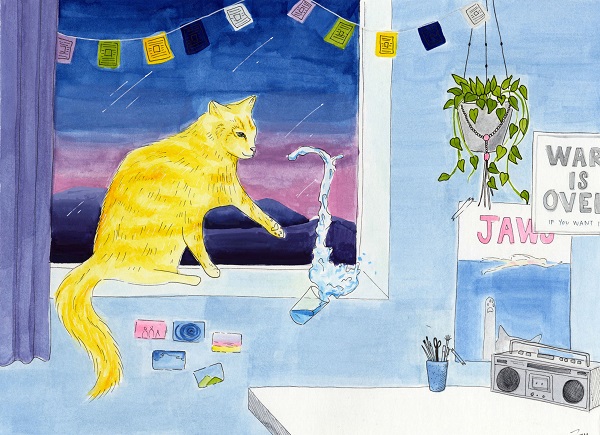Everyday Entropy, In Perspective
Illustrated by Zoë Russ-Hogg
“Aqui nos tocó vivir.”
(This is where we ended up living.)
Cristina Pacheco, Mexican journalist, writer & interviewer.
 The end of the day, and a feeling of exhaustion, as if I were a fish swimming against the current, expending (in my case) energy, resources, time and money. Groceries have been delivered, some eggs in the carton are broken, another mess. The cats look at me scared as I loudly scream why? Why universe, WHY?
The end of the day, and a feeling of exhaustion, as if I were a fish swimming against the current, expending (in my case) energy, resources, time and money. Groceries have been delivered, some eggs in the carton are broken, another mess. The cats look at me scared as I loudly scream why? Why universe, WHY?
Never mind. I still have to start working on this piece about... what again? I don't even remember the topic. I sift through the things on my desk. I'm losing my patience. I need to calm down and breathe.
Found them! My notes from the meeting. The topic: "I notice entropy in..."
My first thought: "I notice entropy everywhere in my whole life.” I glance at my cats, envying them that they are fed. They rewarded me for that with a purr, and now they are asleep.
As I consider the topic of entropy, I remember that the universe, by breaking the eggs in my grocery bag, is not playing games with me. It is simply more probable for things to go from order to disorder, just as every day, every minute and every second I am going from a younger to an older version of myself.
Myself. Who is that? As I reflect on entropy, I realize that we are also the product, as Cristina Pacheco, the Mexican journalist, said at the beginning of every interview, of "where we ended up living.’ There are so many different possibilities that have had to happen for me to be myself. For instance, the fact that I take it as a hardship that the eggs in my delivered bag broke––that point of view is the product, in part, of the world I grew up in, which was very different, say, from the world of my father's generation.
My father worked for a newspaper back in the day––not as a journalist, but as an operator of a Linotype machine, one of the world's great inventions. This machine drastically sped up the printing process and helped revolutionize the newspaper industry by its innovative technique of “line casting,” which placed entire lines of type for printing, rather than just individual letter typesetting. A group of 25 men had to place every letter of every word of every paragraph that would be print in evening edition of the newspaper––and don't forget that they had to be set backwards to be ready for printing. I remember the huge rolls, like huge toilet paper rolls coming in giant trucks for all the copies they had to print.
Thankfully it is now rarely used; today we get our information in the palm of our very own hands in a digital form. There is no need to melt the metal and produce single strips of words to print newspapers to keep us informed. We have new technologies that allow us to improve the production of things, which in turn helps us to live a more orderly life, and, in my case, to be less familiar than my father with physical labour.
At home with my parents, I had to make my bed, keep my room tidy and bring home good grades. I never had to wash dishes or cook. I never had to clean the house or water the plants or cut the grass; those things were done for me.
Therefore, when I became an adult and things changed drastically, it was probably more of an adjustment to me. Besides the bed and the regular housework, I now also have to water the plants, clean the whole apartment, remove all the dust product from the construction of the school across the street. (The city continues to repair pipes and sewers everywhere in the city; nothing I can do about it. It is never ending; the dust is a nightmare.) I have to do the dishes––so thank god for the dishwasher, hot water and electricity. I put the laundry on before I go, this time myself, to do my groceries for the week. The clothes will be ready for the dryer when I return.
Just before I leave the house I pick up all the toys that are all over the floor. I have been cleaning my place since I woke up and it still looks a mess. Let me clarify that I have no kids; the toys belong, yes, to the two kittens we rescued at home, whose names are Romulo and Milano, and yes they are adorable. But they have managed to make huge disaster areas at 3am, have broken plants, and have tracked rocks and soil all over the floor. Why it cannot stay clean? It is never ending, it is exhausting. I can't explain to them that after playing with their toys, they have to put them back on the small basket for their toys labeled: the twins.
Yet the reality of entropy helps to put their mess in perspective: it is a normal part of life. In fact, like my cats, I grew up with many more tools for creating order in my life than my father did, who, nevertheless, had more tools than the generation before him. And because of where I ended up living, sometimes I forget how fortunate I am to not have more entropy in my everyday life than I do.

Comments
No comments posted yet.
You have to be registered and logged in in order to post comments!